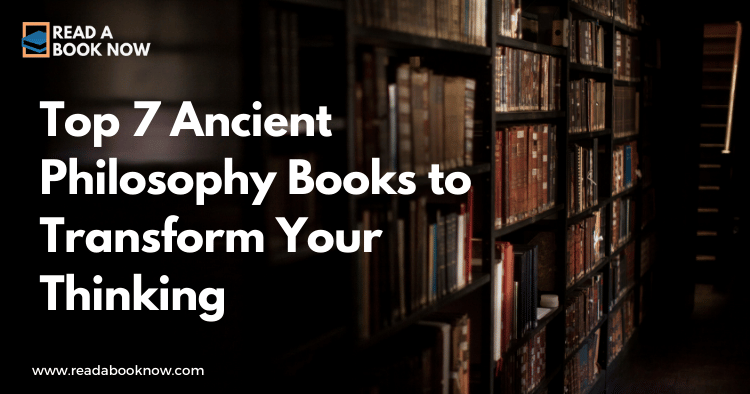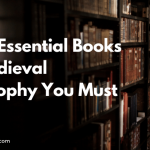Table of Contents
- 1. Introduction
- 2. “The Republic” by Plato
- 3. “Nicomachean Ethics” by Aristotle
- 4. “Meditations” by Marcus Aurelius
- 5. “Tao Te Ching” by Laozi
- 6. “The Analects” by Confucius
- 7. “On the Shortness of Life” by Seneca
- 8. “The Enchiridion” by Epictetus
- 9. Conclusion
- 10. Also Look For
1. Introduction
Ancient philosophy is a treasure trove of wisdom that has shaped the thoughts and ethics of civilizations for centuries. By diving into the works of ancient philosophers, we can gain insights into our own lives and the world around us.
Whether you’re seeking a deeper understanding of ethics, governance, or personal well-being, these texts can transform your thinking.
Let’s explore seven foundational works that can illuminate your path.
2. “The Republic” by Plato
Plato’s “The Republic” is one of the most significant texts in Western philosophy. Written as a dialogue between Socrates and several Athenian citizens, this book examines justice, the nature of the ideal state, and the philosopher-king concept.
Key Concepts:
- The Allegory of the Cave: This metaphor illustrates how individuals can be trapped in ignorance and how education can lead them to enlightenment.
- Justice: Plato explores what it means to be just, both individually and collectively.
- Idealism vs. Realism: The text contrasts ideal forms with the physical world, prompting readers to reflect on their perceptions.
Why Read It?
Reading “The Republic” challenges your understanding of governance and morality, encouraging you to think critically about societal structures.
Further Reading: Stanford Encyclopedia of Philosophy on Plato
3. “Nicomachean Ethics” by Aristotle
Aristotle’s “Nicomachean Ethics” provides an in-depth exploration of moral philosophy. Aristotle argues that the ultimate goal of human life is eudaimonia, often translated as “happiness” or “flourishing.”
Key Concepts:
- Virtue Ethics: Aristotle emphasizes developing good character traits (virtues) as the foundation for a good life.
- The Doctrine of the Mean: Virtue lies between excess and deficiency; for example, courage is the mean between recklessness and cowardice.
- Practical Wisdom (Phronesis): The ability to make sound decisions in practical affairs is crucial for living virtuously.
Why Read It?
“Nicomachean Ethics” offers timeless advice on how to lead a fulfilling life through virtuous actions and sound judgment.
Further Reading: Internet Encyclopedia of Philosophy on Aristotle
4. “Meditations” by Marcus Aurelius
“Meditations” is a series of personal writings by Roman Emperor Marcus Aurelius, offering insights into Stoic philosophy and practical guidance for living a virtuous life.
Key Concepts:
- Stoicism: Focuses on the importance of rationality and self-control over external circumstances.
- Impermanence: Aurelius reminds us that life is fleeting, prompting readers to cherish the present moment.
- Universal Reason (Logos): The idea that a rational structure governs the universe encourages acceptance of fate.
Why Read It?
This book serves as a guide for personal resilience and tranquility in the face of adversity, making it a must-read for anyone seeking inner peace.
Further Reading: Stanford Encyclopedia of Philosophy on Stoicism
5. “Tao Te Ching” by Laozi
The “Tao Te Ching” is a foundational text of Taoism, written by the sage Laozi. This work offers profound teachings on the nature of life, harmony, and the Tao (the Way).
Key Concepts:
- Naturalness (Ziran): Emphasizes going with the flow of life and embracing simplicity.
- Wu Wei: The principle of “non-action” or effortless action teaches the value of aligning with the natural order.
- Dualism: The text explores the balance of opposites, such as yin and yang.
Why Read It?
The “Tao Te Ching” challenges conventional notions of success and encourages readers to seek harmony with themselves and the world around them.
Further Reading: Taoist Philosophy Overview
6. “The Analects” by Confucius
“The Analects” is a collection of sayings and ideas attributed to the Chinese philosopher Confucius and his disciples. This work focuses on ethics, politics, and morality.
Key Concepts:
- Ren (Humaneness): The core virtue in Confucianism, emphasizing compassion and kindness.
- Li (Ritual): The importance of rituals and traditions in cultivating good character and social harmony.
- Filial Piety: The emphasis on respect for one’s elders and ancestors.
Why Read It?
Confucius’ teachings promote social responsibility and moral integrity, making it relevant for those looking to improve their personal and social lives.
Further Reading: Internet Encyclopedia of Philosophy on Confucius
7. “On the Shortness of Life” by Seneca
Seneca’s essay “On the Shortness of Life” is a powerful reflection on the value of time and how to make the most of our limited existence.
Key Concepts:
- Time Management: Seneca argues that time is our most precious resource, and we should use it wisely.
- Living in the Present: The importance of focusing on the present moment rather than constantly seeking future pleasures.
- Philosophy as a Guide: Seneca advocates for philosophy as a means to improve our lives and decision-making.
Why Read It?
This essay serves as a reminder to prioritize what truly matters in life, inspiring readers to live meaningfully and intentionally.
Further Reading: Stanford Encyclopedia of Philosophy on Seneca
8. “The Enchiridion” by Epictetus
“The Enchiridion” is a concise guide to Stoic philosophy by the philosopher Epictetus. It provides practical advice for achieving mental resilience.
Key Concepts:
- Distinction of Control: Understanding what is within our control and what is not is central to Stoic practice.
- Acceptance: Emphasizes accepting external events with a calm and rational mindset.
- Personal Responsibility: Encourages individuals to take responsibility for their thoughts and actions.
Why Read It?
This work is an excellent entry point for anyone interested in applying Stoic principles to modern life, fostering a sense of empowerment and inner strength.
Further Reading: Internet Encyclopedia of Philosophy on Epictetus
9. Conclusion
Exploring ancient philosophy through these seven transformative texts can profoundly impact your thinking and approach to life. Each book offers unique insights into ethics, governance, personal resilience, and the nature of existence.
By engaging with these works, you can cultivate a more thoughtful, meaningful, and fulfilled life. So pick one up today and embark on a journey of intellectual discovery!
10. Also Look For
For further exploration into literature that has shaped thought across cultures and eras, consider delving into these classic literature lists:
- Top 7 Ancient Classics Everyone Should Read Today
- Top 7 Must-Read Medieval Literature Classics You Can’t Miss
- 10 Timeless Classics Everyone Should Read
- 10 Must-Read Russian Classics That Shaped Literature
By immersing yourself in these ancient philosophies and classic literature, you’re not just reading texts; you’re also linking to centuries of wisdom that can help navigate the complexities of modern life. Happy reading!




